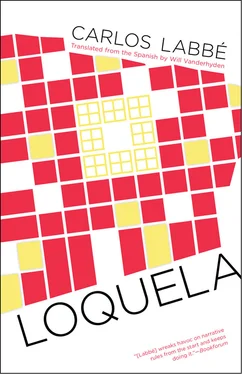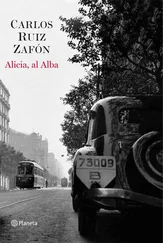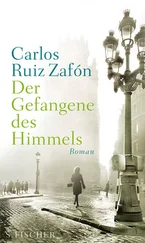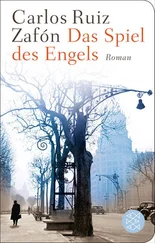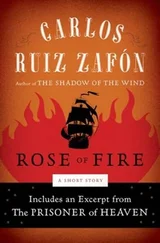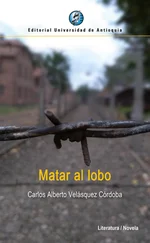Sitting on a bench in the plaza, Carlos was drawing a tree. He groaned and crumpled up the paper, realizing that every day his lines were getting worse; the tree he was sketching looked nothing like the one in front of him, it was more like a building or a statue. A few days ago, his little sister had asked him to teach her to draw hands. To start with he showed her how to copy her own, the left. But in the end, Josefa looked at his drawing and narrowed her eyes: that’s not a hand, she said, it’s the claws of a beast. He put the sketch down beside him and looked around the plaza. A modest, pretty schoolgirl passed by in front of him. Holding her by the hand was a man dressed in a suit and tie, one of those guys who’d run you over to get to the bank on time. What a waste, thought Carlos.
Then he picked up his sketch again. He didn’t give the couple another thought, they’ll end up on some bench somewhere, as usual, he said to himself. The tree was no longer a tree but a gathering of strange shadows, immense stains suggesting shapes: a couple through a window and perhaps someone spying from the corner, lying in wait. He was distracted by a cry that gradually became a scream: a girl was calling for help. He walked calmly to the other side of the plaza, where he found a circle of onlookers gathering around the same schoolgirl he’d seen before, whose torn uniform didn’t cover the bruises on her legs. A compassionate woman who was trying to console the girl retrieved her buttonless blouse from the bushes. A man was asking questions. The degenerate had run away, he realized, and the schoolgirl cried, ignoring all the people, hands covering her face. Nothing about her was sexy now, just the opposite, he thought, walking away. He realized that the girl’s blue uniform was just like the one Elisa had been wearing only a few years before. He remembered afternoons junior year when he’d wait for her outside the school before they’d walk home together down Alcántara. Sometimes she walked a few steps ahead, other times he led the way, but walking backwards, facing Elisa. He never took his eyes off her, not her, not that uniform; he could barely contain the desire to slip his hand up under her blue skirt. He called her from a payphone, fearing she wouldn’t be there. She answered and asked him a question: why did his voice sound so different, like he was someone else entirely.
At last. If it’s difficult for you to comprehend my writing and you get lost in my inconclusive sentences it’s because I write against the waning day. My hours are like cups of water confronting a thirst. Although I’m trying to be as honest as I can, understand that not even on the edge of the pit can I find a way to say the right thing. What matters is my ultimate sincerity, that which speaks to the other, to you and not to me. I’ll use up a lot of ink adapting to your presence, but I trust that it’ll be worth it, or better, that I did the only thing left for me to do. Because there’s not one disinterested sentence here, not even being crazy about you, as they say, alters my intention: to tell you why I found myself forced to abandon Neutria.
When I was a little girl, my hair came down to my waist and sparkled like the snow. Fearful, that’s how children are. But once, hearing Alicia’s warning cries, I turned around and there you were, concealing the scissors in your woolen fingers. I snatched them away from you easily, while you looked at me with surprise but without fear, the same look — let’s say empty yet impassioned — that you gave me last Saturday at Alicia’s party as night was falling; you were intoxicated and charming, and I was intrigued when you responded that yes, that now, with me, you were someone else and not Carlos in Neutria. Let’s not go quite so fast, just fast enough to unsettle your reading and to make you aware that your Sunday headache isn’t just the result of a night of drinking, but of having remembered the most important and hardest thing to remember.
Back then I was very small. You know: smiling, secluded inside the house, my long white hair seeking the light of day to shine. The girl kept hidden three houses away from yours. I spend my time playing with Alicia, tall and attractive. You boys tease us, calling us Snowflake, Miss Transparent, Glassgirl. My hair, long as a summer day, is an obsession for you, because you enjoy ruining things that require care: you stomp on flowers in the garden of a woman who lives all alone, you wake up early to rearrange the pages of the newspaper, freshly dropped on the doorstep, you terrorize, with a dozen different calls, your neighbor’s cage of parrots. You threaten me: doll hair, we’re gonna cut off your doll hair. I’ve gotten used to seeing you through the window, brandishing scissors. I don’t even tell on you, I just run to my room. Alicia is the one who confronts you, with her deafening, high-pitched screams, one time I punch your most annoying friend, the fat one, in the face, and he goes off and cries behind a tree. You make fun of him, and for a little while I get you guys to forget about my hair, because you’re busy inventing a supposed romance between Alicia and her victim, the fat boy.
Allow me this speed with which I write you, a different rhythm from the immobile sentences I sought in most of my notebooks; it’s just that, inevitably, there’s someone zeroing in on this house, someone who wants my end. I shouldn’t say this, but what I hope is that you stop him. Besides, at this point in my recollections, you should already be able to guess what comes next. Because another year passes and again one of you begins to fixate on my hair, which I spend my time brushing. The end of summer, an unusually detailed image from early childhood: the city grayer than ever, people running over each other in the streets to buy textbooks, pens, spiral notebooks, even the sun’s presence is lost, dissolving into the monotone sky, dirty, more dust than anything. It’s the awful Santiago of our childhood, doubly abandoned. So bad that I only recall one moment of fun that took place outside the confines of the house: two naïve girls shouting gleefully, soaking each other with a hose, white with green stripes, me and Alicia. All of a sudden, she freezes. I see myself turning instinctively around and I find your eyes, wide with surprise. You hide the scissors behind your back. I come at you with a violence that frightens even me, grab the scissors away from you, your friends, hanging back a little ways, speculate in low voices, expecting you to defend yourself, not just stand there, impassive, not crying or smiling, doing nothing: that’s a difficult expression for a child to make. Serious as an animal. We leave you there, fixed to that spot, and go inside the house.
You should know this part better than I do. To me it seems that what happens next is that in the following days your group of men — forgive me, boys — gathers in the rundown shack at the abandoned train station that you guys call The Clubhouse and they decide to make an example of you, or maybe to kick you out for being worthless and a coward. The truth is that after I take the scissors away from you, all the pranks you guys pull fail, and so the group begins to fall apart: one family leaves the neighborhood, others disappear without explanation, you avoid meetings at The Clubhouse. It’s possible that you guys just got bored of each other or were too busy with school. I remember realizing that life in the passageway was ending and that we were entering Neutria when I watched the other boys stop in front of your house on their bikes and invite you to go get ice cream; you come out and don’t know how to lie, you don’t understand why, but they believe you when you tell them that you have to go to the supermarket with your mother, for the first time you’re able to get out of going with them, and you’re left alone in the exact moment that Alicia and I say to ourselves that from now on this is Neutria, without even knowing what we mean. I know, I can already hear your arrogant response: it was a childish way to give name to the unknown, to evade fear through familiarization. That’s what you said to me on Saturday, at the party. That sometimes, when you thought about it, you found our overflowing imagination interesting, an intriguing subject for a novel even; but a few pages later we were tragic, demented, frightening.
Читать дальше
